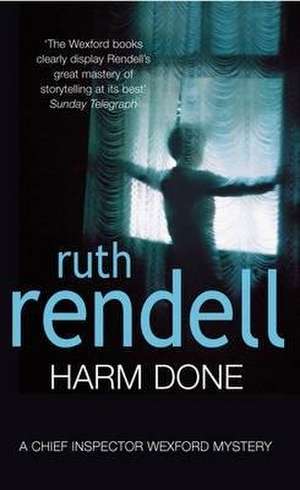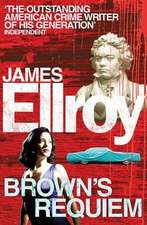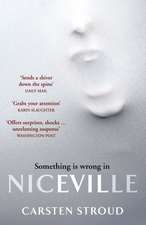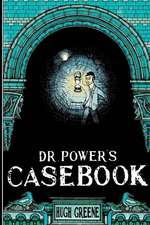Harm Done
Autor Ruth Rendellen Limba Engleză Paperback – 7 sep 2000
| Toate formatele și edițiile | Preț | Express |
|---|---|---|
| Paperback (2) | 106.73 lei 6-8 săpt. | |
| Vintage Books USA – 30 sep 2000 | 109.54 lei 3-5 săpt. | |
| CORNERSTONE – 7 sep 2000 | 106.73 lei 6-8 săpt. |
Preț: 106.73 lei
Nou
Puncte Express: 160
Preț estimativ în valută:
20.42€ • 21.38$ • 16.90£
20.42€ • 21.38$ • 16.90£
Carte tipărită la comandă
Livrare economică 05-19 aprilie
Preluare comenzi: 021 569.72.76
Specificații
ISBN-13: 9780099281344
ISBN-10: 0099281341
Pagini: 480
Dimensiuni: 109 x 177 x 32 mm
Greutate: 0.26 kg
Editura: CORNERSTONE
Locul publicării:United Kingdom
ISBN-10: 0099281341
Pagini: 480
Dimensiuni: 109 x 177 x 32 mm
Greutate: 0.26 kg
Editura: CORNERSTONE
Locul publicării:United Kingdom
Notă biografică
Ruth Rendell has won many awards, including the Crime Writers' Association Gold Dagger for 1976's best crime novel with A Demon in My View; a second Edgar in 1984 from the Mystery Writers of America for the best short story, 'The New Girl Friend'; and a Gold Dagger award for Live Flesh in 1986. She was also the winner of the 1990 Sunday Times Literary award, as well as the Crime Writers' Association Cartier Diamond Dagger. In 1996 she was awarded the CBE and in 1997 became a Life Peer.
Recenzii
"No contemporary writer of suspense stories tries to vary the form's boundaries more than Ruth Rendell" Guardian "The Wexford books clearly display Rendell's great mastery of storytelling at its best" Sunday Telegraph "It is hard to think of another crime writer who so effortlessly incorporates real events [...] into genre fiction, and in a serious manner... Rendell's detective fiction stands almost alone as a chronicle of the dark side of modern life... Rendell offers sufficient clues and red herrings to satisfy the msot dedicated puzzle-solver... Harm Done is a vivid demonstration of Rendell's contribution to contemporary fiction" Independent "One of the greatest novelists presently at work in our language... a writer whose work should be read by anyone who either enjoys a brilliant mystery - or distinguished literature" Scott Turow "More lifelike than many sophisticated thrillers" Sunday Times
Extras
From Chapter 1
On the day Lizzie came back from the dead the police and her family and neighbors had already begun the search for her body. They worked on the open countryside between Kingsmarkham and Myringham, combing the hillsides and beating through the woods. It was April but cold and wet, and a sharp northeast wind was blowing. Their task was not a pleasant one; no one laughed or joked and there was little talking.
Lizzie's stepfather was among the searchers, but her mother was too upset to leave the house. The evening before, the two of them had appeared on television to appeal for Lizzie to come home, for her abductor or attacker, whatever he might be, to release her. Her mother said she was only sixteen, which was already known, and that she had learning difficulties, which was not. Her stepfather was a lot younger than her mother, perhaps ten years, and looked very young. He had long hair and a beard and wore several earrings, all in the same ear. After the television appearance several people phoned Kingsmarkham Police Station and opined that Colin Crowne had murdered his stepdaughter. One said Colin had buried her on the building site down York Street, a quarter of a mile down the road from where the Crownes and Lizzie lived on the Muriel Campden Estate. Another told Detective Sergeant Vine that she had heard Colin Crowne threaten to kill Lizzie "because she was as thick as two planks."
"Those folks as go on telly to talk about their missing kids," said a caller who refused to give her name, "they're always the guilty ones. It's always the dad. I've seen it time and time again. If you don't know that, you've no business being in the police."
Chief Inspector Wexford thought she was dead. Not because of what the anonymous caller said, but because all the evidence pointed that way. Lizzie had no boyfriend, she was not at all precocious, she had a low IQ and was rather slow and timid. Three evenings before, she had gone with some friends on the bus to the cinema in Myringham, but at the end of the film the other two girls had left her to come home alone. They had asked her to come clubbing with them but Lizzie had said her mother would be worried--the friends thought Lizzie herself was worried at the idea--and they left her at the bus stop. It was just before eight-thirty and getting dark. She should have been home in Kingsmarkham by nine-fifteen, but she didn't come home at all. At midnight her mother had phoned the police.
If she had been, well, a different sort of girl, Wexford wouldn't have paid so much attention. If she had been more like her friends. He hesitated about the phrase he used even in his own mind, for he liked to keep to his personal brand of political correctness in his thoughts as well as his speech. Not to be absurd about it, not to use ridiculous expressions like intellectually challenged, but not to be insensitive either and call a girl such as Lizzie Cromwell mentally handicapped or retarded. Besides, she wasn't either of those things, she could read and write, more or less, she had a certain measure of independence and went about on her own. In daylight, at any rate. But she wasn't fit just the same to be left alone after dark on a lonely road. Come to that, what girl was?
So he thought she was dead. Murdered by someone. What he had seen of Colin Crowne he hadn't much liked, but he had no reason to suspect him of killing his stepdaughter. True, some years before he married Debbie Cromwell, Crowne had been convicted of assault on a man outside a pub, and he had another conviction for taking and driving away--in other words, stealing--a car. But what did all that amount to? Not much. It was more likely that someone had stopped and offered Lizzie a lift.
"Would she accept a lift from a stranger?" Vine had asked Debbie Crowne.
"Sometimes it's hard to make her like understand things," Lizzie's mother had said. "She'll sort of say yes and no and smile--she smiles a lot, she's a happy kid--but you don't know if it's like sunk in. Do you, Col?"
"I've told her never talk to strangers," said Colin Crowne. "I've told her till I'm blue in the face, but what do I get? A smile and a nod and another smile, then she'll just say something else, something loony, like the sun's shining or what's for tea."
"Not loony, Col," said the mother, obviously hurt.
"You know what I mean."
So when she had been gone three nights and it was the morning of the third day, Colin Crowne and the neighbors on either side of the Crownes on the Muriel Campden Estate started searching for Lizzie. Wexford had already talked to her friends and the driver of the bus she should have been on but hadn't been on, and Inspector Burden and Sergeant Vine had talked to dozens of motorists who used that road daily around about that time. When the rain became torrential, which happened at about four in the afternoon, they called off the search for that day, but they were set to begin again at first light. Taking DC Lynn Fancourt with him, Wexford went over to Puck Road for another talk with Colin and Debbie Crowne.
When it was built in the sixties, on an open space that would now be called a "green field area," between the top of York Street and the western side of Glebe Road, the three streets and block of flats on a green in the midst of them, it had been called the York Estate. The then chairman of the housing committee, who had done A Midsummer Night's Dream for his school certificate and was proud of the knowledge thus gained, named the streets after characters in that comedy, Oberon, Titania, and Puck.
On the day Lizzie came back from the dead the police and her family and neighbors had already begun the search for her body. They worked on the open countryside between Kingsmarkham and Myringham, combing the hillsides and beating through the woods. It was April but cold and wet, and a sharp northeast wind was blowing. Their task was not a pleasant one; no one laughed or joked and there was little talking.
Lizzie's stepfather was among the searchers, but her mother was too upset to leave the house. The evening before, the two of them had appeared on television to appeal for Lizzie to come home, for her abductor or attacker, whatever he might be, to release her. Her mother said she was only sixteen, which was already known, and that she had learning difficulties, which was not. Her stepfather was a lot younger than her mother, perhaps ten years, and looked very young. He had long hair and a beard and wore several earrings, all in the same ear. After the television appearance several people phoned Kingsmarkham Police Station and opined that Colin Crowne had murdered his stepdaughter. One said Colin had buried her on the building site down York Street, a quarter of a mile down the road from where the Crownes and Lizzie lived on the Muriel Campden Estate. Another told Detective Sergeant Vine that she had heard Colin Crowne threaten to kill Lizzie "because she was as thick as two planks."
"Those folks as go on telly to talk about their missing kids," said a caller who refused to give her name, "they're always the guilty ones. It's always the dad. I've seen it time and time again. If you don't know that, you've no business being in the police."
Chief Inspector Wexford thought she was dead. Not because of what the anonymous caller said, but because all the evidence pointed that way. Lizzie had no boyfriend, she was not at all precocious, she had a low IQ and was rather slow and timid. Three evenings before, she had gone with some friends on the bus to the cinema in Myringham, but at the end of the film the other two girls had left her to come home alone. They had asked her to come clubbing with them but Lizzie had said her mother would be worried--the friends thought Lizzie herself was worried at the idea--and they left her at the bus stop. It was just before eight-thirty and getting dark. She should have been home in Kingsmarkham by nine-fifteen, but she didn't come home at all. At midnight her mother had phoned the police.
If she had been, well, a different sort of girl, Wexford wouldn't have paid so much attention. If she had been more like her friends. He hesitated about the phrase he used even in his own mind, for he liked to keep to his personal brand of political correctness in his thoughts as well as his speech. Not to be absurd about it, not to use ridiculous expressions like intellectually challenged, but not to be insensitive either and call a girl such as Lizzie Cromwell mentally handicapped or retarded. Besides, she wasn't either of those things, she could read and write, more or less, she had a certain measure of independence and went about on her own. In daylight, at any rate. But she wasn't fit just the same to be left alone after dark on a lonely road. Come to that, what girl was?
So he thought she was dead. Murdered by someone. What he had seen of Colin Crowne he hadn't much liked, but he had no reason to suspect him of killing his stepdaughter. True, some years before he married Debbie Cromwell, Crowne had been convicted of assault on a man outside a pub, and he had another conviction for taking and driving away--in other words, stealing--a car. But what did all that amount to? Not much. It was more likely that someone had stopped and offered Lizzie a lift.
"Would she accept a lift from a stranger?" Vine had asked Debbie Crowne.
"Sometimes it's hard to make her like understand things," Lizzie's mother had said. "She'll sort of say yes and no and smile--she smiles a lot, she's a happy kid--but you don't know if it's like sunk in. Do you, Col?"
"I've told her never talk to strangers," said Colin Crowne. "I've told her till I'm blue in the face, but what do I get? A smile and a nod and another smile, then she'll just say something else, something loony, like the sun's shining or what's for tea."
"Not loony, Col," said the mother, obviously hurt.
"You know what I mean."
So when she had been gone three nights and it was the morning of the third day, Colin Crowne and the neighbors on either side of the Crownes on the Muriel Campden Estate started searching for Lizzie. Wexford had already talked to her friends and the driver of the bus she should have been on but hadn't been on, and Inspector Burden and Sergeant Vine had talked to dozens of motorists who used that road daily around about that time. When the rain became torrential, which happened at about four in the afternoon, they called off the search for that day, but they were set to begin again at first light. Taking DC Lynn Fancourt with him, Wexford went over to Puck Road for another talk with Colin and Debbie Crowne.
When it was built in the sixties, on an open space that would now be called a "green field area," between the top of York Street and the western side of Glebe Road, the three streets and block of flats on a green in the midst of them, it had been called the York Estate. The then chairman of the housing committee, who had done A Midsummer Night's Dream for his school certificate and was proud of the knowledge thus gained, named the streets after characters in that comedy, Oberon, Titania, and Puck.
Descriere
Descriere de la o altă ediție sau format:
Behind the picture-postcard facade of Kingsmarkham lies a community rife with violence, betrayal, and a taste for vengeance. When a three-year-old girl disappears, the public's outrage turns toward a recently released pederast, and Wexford must unravel the mystery before a vigilante mob metes out rough justice.
Behind the picture-postcard facade of Kingsmarkham lies a community rife with violence, betrayal, and a taste for vengeance. When a three-year-old girl disappears, the public's outrage turns toward a recently released pederast, and Wexford must unravel the mystery before a vigilante mob metes out rough justice.












